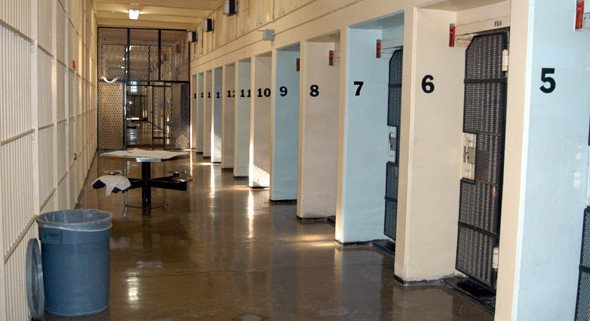Opinion
Latinos’ role crucial in fixing correctional system
 A section of the San Quentin Prison area for condemned inmates. Photo via SanQuentinBlog.org
A section of the San Quentin Prison area for condemned inmates. Photo via SanQuentinBlog.orgHere in Los Angeles, home to Hollywood, anyone will tell you that casting is key http://bambawefushia.com/elite-singles-no/. A film’s meaning and potential are lost if it’s miscast or missing the right characters.
The same could be said about a blockbuster story that has been playing out for decades in California: our bloated and costly prisons. Much attention has been paid to lawsuits about the conditions in these packed facilities, as well as the response by the Governor, Legislature and others.
Evidence suggests that hate crimes against Latinos have risen as Latino immigration increases, and concerns over immigration enforcement may reduce the reporting of crime.
Calling for change is a diverse chorus, including forward-thinking law enforcement officials, crime victims, business leaders and organized labor. But characters central to this drama are rarely mentioned: Latinos. The impact of failed criminal justice policies has greatly affected Latinos, families and entire communities, giving rise to a new role Latinos can play in reshaping the justice system.
Today we released a new report that paints a grim picture of how poorly Californian’s safety systems are protecting – and treating – Latinos. LatinoVoices: The Impacts of Crime and Criminal Justice Policies on Latinos includes findings from a year-long study of data in California and nationwide by the Tomás Rivera Policy Institute at USC, along with new survey data on California Latino voters.
The report finds that Latinos are more likely than whites to be victims of gun violence, burglaries and homicides (twice the rate in California). A 2013 survey of California victims found that Latinos experienced repeat crime more than survivors overall. Less than half knew about victim services, and those who did often found them difficult to access.
The politics surrounding immigration also impacts Latino victimization. Evidence suggests that hate crimes against Latinos have risen as Latino immigration increases, and concerns over immigration enforcement may reduce the reporting of crime. In a 2013 survey in southwestern counties (including L.A. County), 44% of Latinos said they would be hesitant to report being a victim of crime for fear that the police would ask them or others about immigration status.
Making matters worse is California’s disproportionate investment into prisons and jails instead of crime prevention.
The report reveals equaling troubling trends for Latinos in the justice system: Latinos are less likely than whites and African Americans to be offered bail or release from jail as they await trial for similar charges, and bail amounts are higher, if offered. Latinos also were more likely to be incarcerated than whites when convicted of similar property and drug crimes, and more likely to be reincarcerated if convicted for a repeat offense.
These findings have real-world consequences. Whether suffering from a traumatic crime without help or locked away from your family for long prison sentences, each outcome has a destabilizing effect on entire families and communities.
Making matters worse is California’s disproportionate investment into prisons and jails instead of crime prevention. As the state and counties spent more and more on incarceration, less taxpayer resources were available for education, mental health, drug treatment, victims services, reentry programs for people leaving prison and other proven ways to prevent crimes.
It is therefore not surprising that Latinos support change. A May/June 2014 survey finds that California Latino voters believe the state should focus more on supervised probation and rehabilitation (51%) than sending more people to jail/prison (11%). Eight in 10 Latinos (78%) support the state in shortening longer criminal sentences and using the savings in prison costs to invest in education, health services and prevention.
Such opinions echo calls from other Californians to revamp the state’s sentencing laws, which have been driven by politics, not public safety science. These changes will not come easily, and they will not come at all if Latinos don’t flex their political muscle.
Policymakers may hold the pen with legislation, but voters guide their hand. As the largest share of California’s population – and its fastest-growing voter bloc – Latinos must put their stamp on new policies and safety priorities.
That’s why several local and national organizations are rallying Latinos to demand smarter justice policies. This includes longtime civil rights and immigrant advocates, nonprofits focused on specific Latino populations, and new players organizing Latinos for action online.
Because for this movie to have a happy end, a full cast of Latino characters must step forward to play the leading role.
—
Ed’s Note: Delia de la Vara is Vice President of the California Region for of the National Council of La Raza. Lenore Anderson is Executive Director of Californians forSafety and Justice.
Want to see more stories like this? Sign up for The Roundup, the free daily newsletter about California politics from the editors of Capitol Weekly. Stay up to date on the news you need to know.
Sign up below, then look for a confirmation email in your inbox.

Leave a Reply